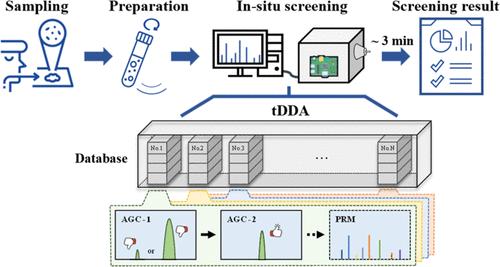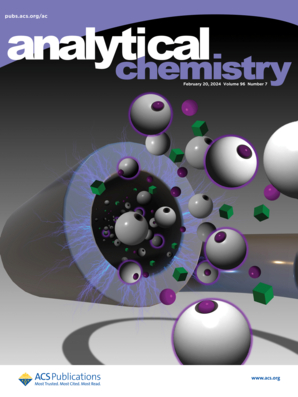tDDA:复杂矩阵中快速筛选目标的目标数据依赖获取模式
IF 6.7
1区 化学
Q1 CHEMISTRY, ANALYTICAL
引用次数: 0
摘要
小型化质谱仪由于其高特异性和便携性,为原位分析提供了巨大的潜力。在传统的数据依赖采集(DDA)模式中,串联分析的前体离子是基于全扫描质谱选择的。然而,原位应用通常需要直接分析复杂的样品,而不需要广泛的样品预处理,使它们容易受到化学噪声的影响,从而导致假阴性。为了解决这一挑战,我们提出了一种靶向数据依赖采集(tDDA)模式,该模式大大提高了复杂矩阵中目标化合物的准确检测。与传统的DDA不同,tDDA方法消除了对全扫描质谱的依赖,在全扫描质谱中,感兴趣的信号通常被矩阵效应所掩盖。这种方法利用正弦调频(SAM-SFM)波形技术的正弦调幅,可以实时生成隔离波形,使tDDA能够实现并行、高速筛选。此外,靶向自动增益控制(AGC)技术增强了对低浓度分析物的检测,进一步降低了假阴性率。在改进的“Brick”小型化离子阱质谱仪上成功集成并验证了tDDA模式。实验结果表明,它能够检测血液和唾液样本中低浓度的非法药物,突出了其在现场有效筛查方面的潜力。本文章由计算机程序翻译,如有差异,请以英文原文为准。

tDDA: A Targeted Data-Dependent Acquisition Mode for Rapid Screening of Targets in Complex Matrices
Miniaturized mass spectrometers offer significant potential for in situ analysis due to their high specificity and portability. In traditional data-dependent acquisition (DDA) mode, precursor ions for tandem analysis are selected based on the full-scan mass spectrum. However, in situ applications often require the direct analysis of complex samples without extensive sample pretreatment, making them susceptible to chemical noise that can result in false negatives. To address this challenge, we propose a targeted data-dependent acquisition (tDDA) mode that substantially improves the accurate detection of target compounds in complex matrices. Unlike conventional DDA, the tDDA method eliminates reliance on the full-scan mass spectrum, where signals of interest are often obscured by matrix effects. This approach leverages sine amplitude modulation of sinusoidal frequency modulated (SAM-SFM) waveforms technology, which enables the real-time generation of isolated waveforms, allowing tDDA to achieve parallel, high-speed screening. Additionally, targeted automatic gain control (AGC) technology enhances the detection of low-concentration analytes, further reducing the false-negative rate. The tDDA mode was successfully integrated and validated on a modified “Brick” miniaturized ion trap mass spectrometer. Experimental results demonstrated its capability to detect low concentrations of illicit drugs spiked in blood and saliva samples, highlighting its potential for effective in situ screening.
求助全文
通过发布文献求助,成功后即可免费获取论文全文。
去求助
来源期刊

Analytical Chemistry
化学-分析化学
CiteScore
12.10
自引率
12.20%
发文量
1949
审稿时长
1.4 months
期刊介绍:
Analytical Chemistry, a peer-reviewed research journal, focuses on disseminating new and original knowledge across all branches of analytical chemistry. Fundamental articles may explore general principles of chemical measurement science and need not directly address existing or potential analytical methodology. They can be entirely theoretical or report experimental results. Contributions may cover various phases of analytical operations, including sampling, bioanalysis, electrochemistry, mass spectrometry, microscale and nanoscale systems, environmental analysis, separations, spectroscopy, chemical reactions and selectivity, instrumentation, imaging, surface analysis, and data processing. Papers discussing known analytical methods should present a significant, original application of the method, a notable improvement, or results on an important analyte.
 求助内容:
求助内容: 应助结果提醒方式:
应助结果提醒方式:


